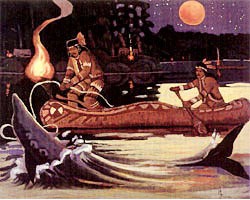Extracts from Maliseet &Mi’kmaq:
First Nations of the Maritimes by Robert Leavitt
Knowing the Environment

They saw new kinds of herbs and trees begin to grow. They encountered new species of ducks and saw the first moose and beaver. They discovered each new type of fish that made its way into the fresh and salt water. They witnessed the development of the first clam flats and the disappearance of the last swordfish as the pattern of ocean currents changed in the Bay of Fundy.
For the environment was not always the same as it is today. About 13,000 years ago, most of the land was still covered by ice - the last of several "Ice Ages."
We can still see where glaciers scraped away the surface of the earth and left deposits of gravel and enormous boulders - like those found in the Spednik Lake region of western New Brunswick.
The sea, too, once came far in over the land, so that the seashells and walrus bones are found today in high places, such as the upper St. John River Valley, many kilometres from the ocean.
The Native people of the Maritime region knew their environment very well. Their knowledge was based on lifelong observation.
They responded to the gradual changes in food resources by adapting their technology. They were always able to tap the most plentiful species of fish and game, grains and seeds, fruits and vegetables.
Sometimes they had to adapt quickly - when it was a bad year for duck-hunting, for example. But they also changed their way of life gradually, over thousands of years, as the climate changed and the general environment no longer supported animals that had once been important for food.
Mastodons and woolly mammoths were found here just after the last Ice Age, perhaps at the same time as the earliest people. Swordfish were once caught in the Bay of Fundy, but the water is too cold for them now.
The people of the Maritime region were fishermen, hunters and gatherers. To early European visitors, the abundance of fish and game in the Maritime region was incredible. Again and again they commented on it in their diaries and letters home.
The Mi'kmaqs and the Maliseets used all the great variety of resources in the woods, lakes, rivers, and ocean around them. They chose to settle in places near the animals and plants they depended upon for food - good hunting or fishing spots.
If one resource failed - if, for example, there weren't enough salmon one spring - they turned to something else. In this way, they lived through hard times to times of plenty again. There isn't even a word for "scarcity" in Mi'kmaq or Maliseet.

The Native people of the Maritime region knew their environment very well. Their knowledge was based on lifelong observation.
They responded to the gradual changes in food resources by adapting their technology. They were always able to tap the most plentiful species of fish and game, grains and seeds, fruits and vegetables.
Sometimes they had to adapt quickly - when it was a bad year for duck-hunting, for example. But they also changed their way of life gradually, over thousands of years, as the climate changed and the general environment no longer supported animals that had once been important for food.
Mastodons and woolly mammoths were found here just after the last Ice Age, perhaps at the same time as the earliest people. Swordfish were once caught in the Bay of Fundy, but the water is too cold for them now.
The people of the Maritime region were fishermen, hunters and gatherers. To early European visitors, the abundance of fish and game in the Maritime region was incredible. Again and again they commented on it in their diaries and letters home.
The Mi'kmaqs and the Maliseets used all the great variety of resources in the woods, lakes, rivers, and ocean around them. They chose to settle in places near the animals and plants they depended upon for food - good hunting or fishing spots.
If one resource failed - if, for example, there weren't enough salmon one spring - they turned to something else. In this way, they lived through hard times to times of plenty again. There isn't even a word for "scarcity" in Mi'kmaq or Maliseet.
